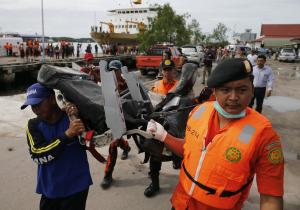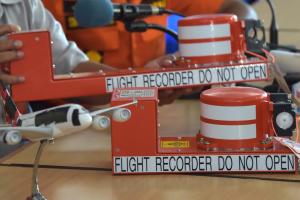An AirAsia plane that crashed into the Java Sea last month with 162 people on board climbed faster than normal and then stalled, the Indonesian transport minister said Tuesday.
Flight QZ8501 went down on December 28 in stormy weather, during what was supposed to be a short trip from the Indonesian city of Surabaya to Singapore.
Indonesia's meteorological agency has said bad weather may have caused the crash, and investigators are analysing the data from the jet's black boxes before releasing a preliminary report.
Just moments before the plane disappeared off the radar, the pilot had asked to climb to avoid the storm. He was not immediately granted permission due to heavy air traffic.
"In the final minutes, the plane climbed at a speed which was beyond normal," Transport Minister Ignasius Jonan told reporters, citing radar data.
"The plane suddenly went up at a speed above the normal limit that it was able to climb to. Then it stalled."
Earlier at a parliamentary hearing, he said radar data showed the Airbus A320-200 appeared at one point to be climbing at a rate of 6,000 feet (1,800 metres) a minute before the crash. There were several other planes in the area at the time.
"I think it is rare even for a fighter jet to be able to climb 6,000 feet per minute," he said. "For a commercial flight, climbing around 1,000 to 2,000 (feet) is maybe already considered extraordinary, because it is not meant to climb that fast."
However, defence aviation experts said the minister's statement was incorrect, adding that a fighter jet flying at an altitude of 10,000 metres is capable of climbing 10,000 feet per minute.
- Terrorism ruled out -
The minister's comments came after Indonesian investigators said they were focusing on the possibility of human error or problems with the plane having caused the crash, following an initial analysis of the cockpit voice recorder.
"We didn't hear any other person, no explosion," investigator Nurcahyo Utomo told reporters, explaining why terrorism had been ruled out.
Investigators from the National Transportation Safety Committee were now looking at the "possibility of plane damage and human factors", he said, without giving further details.
As well as the cockpit voice recorder, the committee is also examining a wealth of information in the flight data recorder, which monitors every major part of the plane. A preliminary report will be released on January 28.
There was a huge international hunt for the crashed plane, involving ships from several countries including the US and China.
Indonesian search and rescue teams have so far recovered just 53 bodies from the sea.
But last week a Singapore navy ship located the jet's main body, with the AirAsia motto "Now Everyone Can Fly" painted on the side. Rescue teams hope they will be able to find many of the passengers and crew inside.
However, divers have not succeeded in reaching the fuselage despite several attempts due to bad weather, high waves and strong underwater currents.
All but seven of those on board the flight were Indonesian. The foreign nationals were from South Korea, Singapore, Malaysia, Britain and France. LINK




